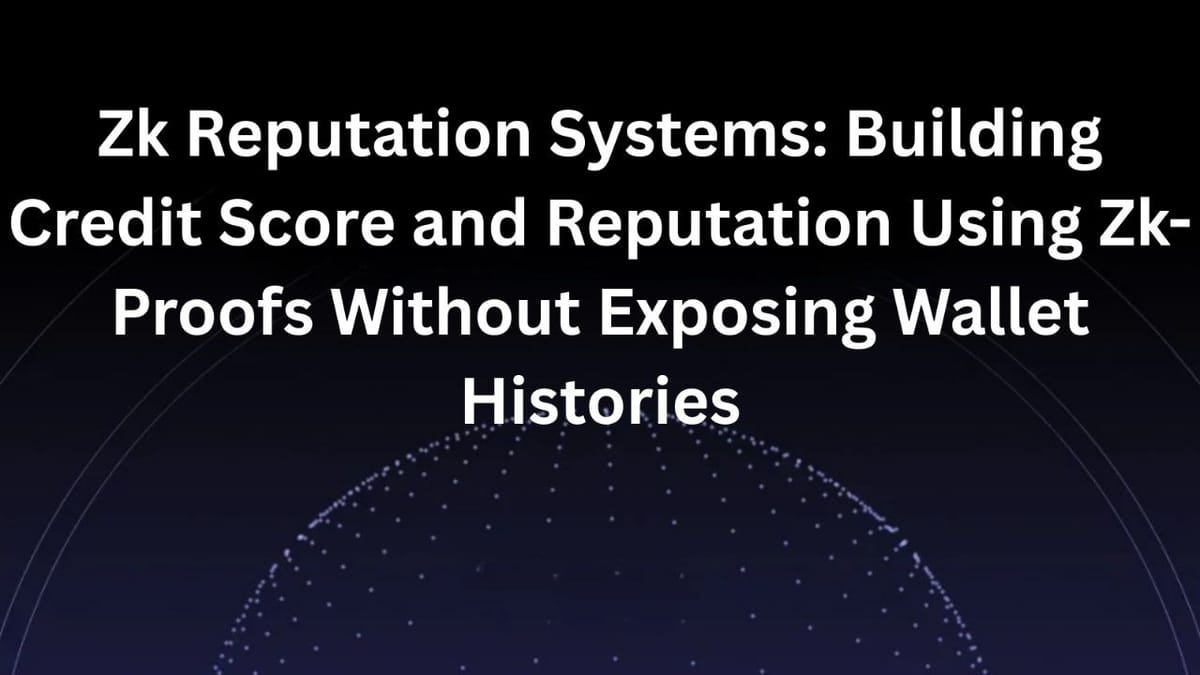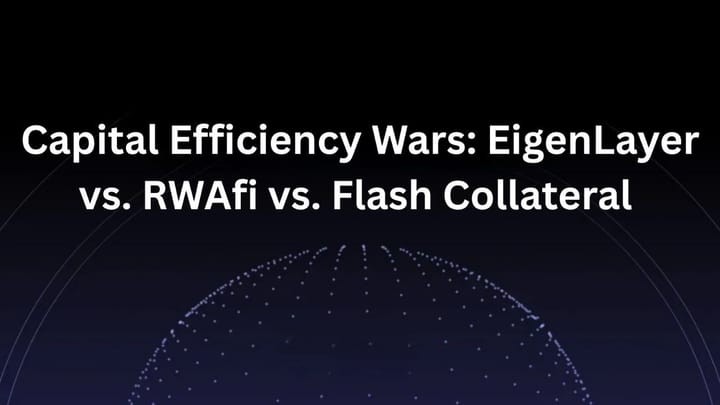ZK Reputation Systems: Building Credit Scores and Reputation Using ZK-Proofs Without Exposing Wallet Histories

Introduction
In the rapidly evolving landscape of blockchain technology and decentralized finance (DeFi), the need for robust reputation systems has become increasingly apparent. Traditional credit scoring and reputation mechanisms often rely on centralized authorities that collect and analyze vast amounts of personal data, leading to privacy concerns and potential misuse of information. This is where Zero-Knowledge Proofs (ZKPs) come into play, offering a revolutionary approach to building credit scores and reputations while preserving user privacy.
ZK reputation systems leverage the power of ZKPs to allow users to prove their trustworthiness without revealing sensitive information, such as wallet histories or personal identities. This article delves into the intricacies of ZK reputation systems, exploring their components, applications, challenges, and future directions. We will also discuss how these systems can enhance sybil resistance and social capital in decentralized environments.
1. Understanding Zero-Knowledge Proofs
1.1 What are Zero-Knowledge Proofs?
Zero-Knowledge Proofs are cryptographic protocols that enable one party (the prover) to demonstrate to another party (the verifier) that a statement is true without revealing any information beyond the validity of the statement itself. This concept was first introduced by Shafi Goldwasser, Silvio Micali, and Charles Rackoff in the 1980s and has since become a cornerstone of modern cryptography.
1.2 Key Properties of ZKPs
- Completeness: If the statement is true, an honest verifier will be convinced by an honest prover.
- Soundness: If the statement is false, no cheating prover can convince the verifier that it is true, except with some small probability.
- Zero-Knowledge: If the statement is true, the verifier learns nothing other than the fact that the statement is true.
1.3 Types of Zero-Knowledge Proofs
- Interactive ZKPs: Involves a back-and-forth communication between the prover and verifier.
- Non-Interactive ZKPs (NIZKPs): The proof can be sent to the verifier without further interaction, often using a common reference string.
1.4 Applications of ZKPs
ZKPs have a wide range of applications, including:
- Cryptocurrencies: Enhancing privacy in transactions (e.g., Zcash).
- Authentication: Proving identity without revealing personal information.
- Voting Systems: Ensuring voter anonymity while verifying votes.
2. The Need for Reputation Systems in Decentralized Environments
2.1 Traditional Reputation Systems
In traditional systems, reputation is often built on centralized databases that aggregate user data, such as transaction histories, social interactions, and feedback scores. While these systems can provide a measure of trust, they also have significant drawbacks:
- Privacy Concerns: Users must disclose personal information, which can be exploited or misused.
- Centralization: A single point of failure can lead to data breaches and manipulation.
- Sybil Attacks: Malicious actors can create multiple identities to manipulate reputation scores.
2.2 The Role of Reputation in Decentralized Systems
In decentralized environments, reputation plays a crucial role in facilitating trustless interactions. Users need a way to assess the credibility of others without relying on centralized authorities. This is where ZK reputation systems come into play, offering a privacy-preserving solution to establish trust.
3. Building Credit Scores with ZK Reputation Systems
3.1 Mechanism of ZK Reputation Systems
ZK reputation systems utilize ZKPs to allow users to prove their creditworthiness based on their transaction history or other relevant metrics without revealing the underlying data. The process typically involves the following steps:
- Data Collection: Users generate cryptographic proofs based on their transaction history, social interactions, or other relevant metrics.
- Proof Generation: The user creates a ZKP that demonstrates their creditworthiness without disclosing sensitive information.
- Verification: Third parties (e.g., lenders, service providers) can verify the proof without accessing the user's data.
3.2 Example of a ZK Reputation System
Consider a decentralized lending platform where users can borrow and lend cryptocurrencies. Instead of requiring users to disclose their entire transaction history, the platform can implement a ZK reputation system as follows:
- User A wants to borrow funds: They generate a ZKP that proves they have a credit score above a certain threshold based on their past transactions.
- User B, the lender, receives the proof: They can verify the proof without knowing User A's transaction history.
- Loan Approval: If the proof is valid, User B can confidently lend to User A, knowing they have a reliable credit score.
3.3 Benefits of ZK Reputation Systems
- Privacy Preservation: Users can prove their trustworthiness without revealing sensitive information.
- Decentralization: Eliminates the need for centralized authorities, reducing the risk of data breaches.
- Sybil Resistance: By requiring cryptographic proofs of unique identity, ZK reputation systems can mitigate sybil attacks.
4. Enhancing Social Capital Through ZK Reputation Systems
4.1 The Concept of Social Capital
Social capital refers to the networks, relationships, and norms that facilitate cooperation and trust within a community. In decentralized environments, social capital is essential for fostering collaboration and ensuring the success of various projects.
4.2 How ZK Reputation Systems Foster Social Capital
- Trust Building: By allowing users to validate their contributions and reliability without compromising their privacy, ZK reputation systems can enhance trust within communities.
- Encouraging Participation: Users may be more willing to engage in decentralized platforms if they know their privacy is protected while still being able to establish a reputation.
- Strengthening Community Ties: As users build trust through ZK reputation systems, they are more likely to collaborate and support one another, leading to stronger community bonds.
4.3 Case Study: Decentralized Autonomous Organizations (DAOs)
DAOs are organizations governed by smart contracts on a blockchain, allowing for decentralized decision-making. ZK reputation systems can play a vital role in DAOs by:
- Voting Mechanisms: Ensuring that votes are cast anonymously while still allowing for verification of voting power based on reputation.
- Funding Decisions: Allowing members to prove their contributions to the DAO without revealing their identities or transaction histories.
5. Challenges and Considerations
1. Technical Complexity
Implementing ZK reputation systems requires a deep understanding of cryptography and may pose challenges in terms of scalability and user experience. The complexity of generating and verifying ZKPs can be a barrier to entry for some users.
2. Regulatory Compliance
As ZK reputation systems operate in a legal gray area, ensuring compliance with data protection regulations (such as GDPR) is crucial. Developers must navigate the regulatory landscape to ensure that their systems do not inadvertently violate privacy laws.
3. User Adoption
Educating users about the benefits and functionalities of ZK reputation systems is essential for widespread adoption. Users may be hesitant to adopt new technologies, especially if they do not fully understand how they work.
6. Future Directions for ZK Reputation Systems
1. Integration with Existing Systems
Exploring how ZK reputation systems can be integrated into current financial and social platforms is a critical area for future research. By enhancing existing systems with privacy-preserving reputation mechanisms, developers can create more secure and trustworthy environments.
2. Research and Development
Continued research into improving the efficiency and usability of ZKPs will be vital for the evolution of ZK reputation systems. Innovations in cryptographic techniques and algorithms can lead to faster and more user-friendly implementations.
3. Community Engagement
Engaging with communities to understand their needs and concerns regarding privacy and reputation will help tailor solutions that are both effective and user-friendly. Feedback from users can guide the development of ZK reputation systems to ensure they meet real-world needs.
Conclusion
ZK reputation systems represent a significant advancement in the quest for privacy-preserving trust mechanisms in decentralized environments. By leveraging zero-knowledge proofs, these systems enable users to establish credit scores and reputations without exposing sensitive information. As the demand for privacy and security continues to grow, ZK reputation systems have the potential to reshape the landscape of decentralized finance and social interactions.
The journey toward widespread adoption of ZK reputation systems will require collaboration among developers, researchers, and users. By addressing the challenges and exploring future directions, we can create a more secure and trustworthy digital ecosystem that respects user privacy while fostering collaboration and trust.


Comments ()